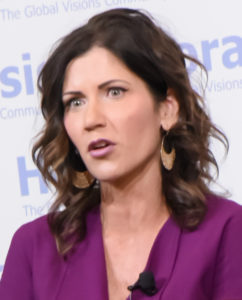South Dakota Governor Kristi Noem, a Republican who is often mentioned as a potential running mate to the presumptive nominee Donald Trump's presidential bid, was banished from two more tribes in her state last week. The banishment is the latest fallout from her paternalistic leadership style toward tribes.

Last Friday, the Yankton Sioux Tribe voted to ban Noem from their reservation. Earlier in the week, the Sisseton-Wahpeton Ovate tribe banned her. Four other tribes, the Oglala, Rosebud, Cheyenne River, and Standing Rock Sioux tribes, previously informed the governor that she is not welcome on their tribal lands.
Tribal leaders took exception to Noem's comments at a community forum in March.
"We've got some tribal leaders that I believe are personally benefiting from the cartels being there, and that's why they attack me every day," Noem said at a forum. "But I'm going to fight for the people who actually live in those situations, who call me and text me every day and say,' Please, dear governor, please come help us in Pine Ridge. We are scared.'"
Responding to the governor's statement, Standing Rock Sioux Tribe Janet Alkire said the Noem should work to solve the problems tribes face in South Dakota.
"Rather than make uninformed and unsubstantiated claims, Noem should work with tribal leaders to increase funding and resources for tribal law enforcement and education," Alkire said.
The latest banishment means that the South Dakota governor is banned from six of the nine federally recognized tribes in the state. In land mass combined, the reservations of the six tribes make up almost 20 percent of South Dakota.
The Noem rift has caused one philanthropic foundation to hold back opening several chapters in the state. On Friday, the Uvalde Foundation for Kids, a national nonprofit student advocacy organization formed in response to the May 2022 Uvalde, Texas school shooting, canceled plans to expand into South Dakota indefinitely.
Uvalde Foundation founder Daniel Chapin, who is half Cherokee Indian, stated the foundation stands firmly with the South Dakota tribes that have chosen to banish Noem.
The governor's racially charged depiction of the Native American family and the alleged dysfunction of its education system is only an illustration by the governor of another abject failure to take responsibility for the broken promises and educational failures of its own system," Chapin said in a statement.
"Resources funding cuts and reallocating funding from tribal distributions to the governor's other agendas seems to be her priority. The governor owes an apology, not simply to the Native American community and its education system but to South Dakota residents as well. The governor should be ashamed, and we will continue to support those tribal communities in protest," Chapin continued.
More Stories Like This
Native News Weekly (August 25, 2024): D.C. BriefsUS Presidents in Their Own Words Concerning American Indians
Federal Judge Orders ICE to Halt Use of Pepper Spray, Arrests of Peaceful Protesters in Twin Cities
Tunica-Biloxi Cultural Leader John D. Barbry Walks On
Next on Native Bidaské: Federal ICE Activity in Minneapolis: Ruth Buffalo’s Perspective
Help us defend tribal sovereignty.
At Native News Online, our mission is rooted in telling the stories that strengthen sovereignty and uplift Indigenous voices — not just at year’s end, but every single day.
Because of your generosity last year, we were able to keep our reporters on the ground in tribal communities, at national gatherings and in the halls of Congress — covering the issues that matter most to Indian Country: sovereignty, culture, education, health and economic opportunity.
That support sustained us through a tough year in 2025. Now, as we look to the year ahead, we need your help right now to ensure warrior journalism remains strong — reporting that defends tribal sovereignty, amplifies Native truth, and holds power accountable.
 The stakes couldn't be higher. Your support keeps Native voices heard, Native stories told and Native sovereignty defended.
The stakes couldn't be higher. Your support keeps Native voices heard, Native stories told and Native sovereignty defended.
Stand with Warrior Journalism today.
Levi Rickert (Potawatomi), Editor & Publisher


